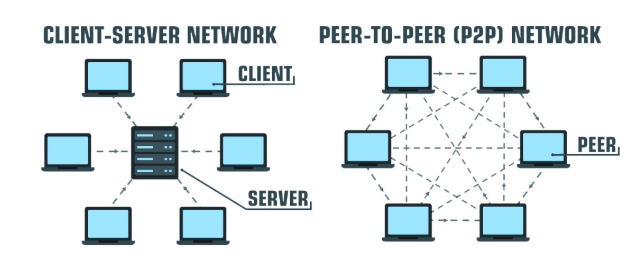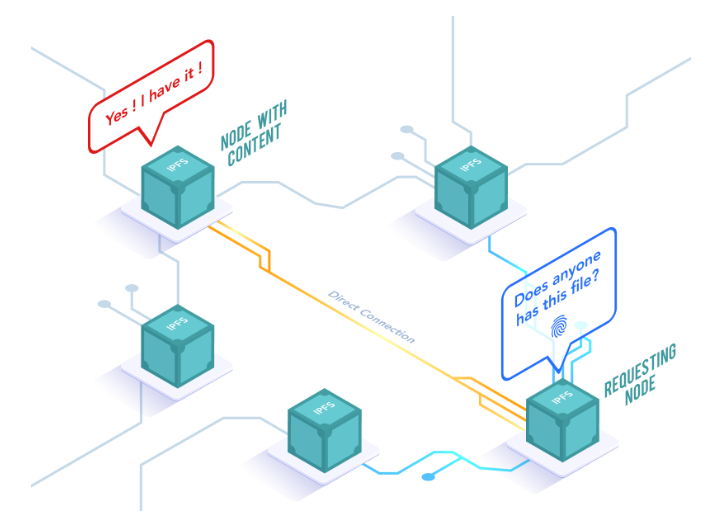Inventory|Distributed cloud storage market wants to "recapture the Internet from the Internet"
This article is the first in a series of articles, aiming to start with the difference between IPFS and HTTP, Bittorrent, and talk about the rise of the decentralized cloud storage market.
One of the biggest innovations in our lives today since the last century has been the Internet. In the early days, the Internet was a decentralized ecosystem, and open protocols such as TCP/IP and SMTP helped build different types of applications on the Internet, such as the World Wide Web, email services, and messaging services. However, today's Internet is centralized, and Mashable has published an article saying that the Internet is currently dominated by ten technology companies that are investing heavily in servers that store our data and information. Admittedly, centralization benefits include higher speeds, lower latency, higher availability, and greater throughput. But these benefits come at the cost of serious flaws, such as data attacks, security breaches, censorship, and lack of data control. Excessive "centralization" also means that users can be banned from accessing any program, even without Choice. Therefore, “centralization” is slowly stifling the Internet ecosystem.
So what is decentralization? In terms of technology, it means a system that does not rely on central authority and has no single point of failure. Professionally, decentralization is a function of the distributed architecture, where decisions are performed independently by all participating nodes, independent of a single node. In this way, decentralization and distribution are more related to governance, decision-making, and control.

- Graphic tracking PlusToken running funds, 28,500 BTC changes, one of the magical trades left eggs
- Babbitt column | The core function of Bitcoin, is it stored value or paid?
- Defi reports: The total amount of encrypted loans is approaching $5 billion, and interest earns only 1.83%.
The earliest example of a distributed system was the Internet itself, which was hosted on a personal computer; followed by Napster and BitTorrent, which laid the foundation for peer-to-peer (p2p) file sharing. Among them, the BitTorrent protocol has become the most famous and widely adopted protocol, and is still used in various applications.

Talking about "distributed cloud storage" means that users can distribute data across many different nodes in multiple locations instead of being stored on a single node that is independent of each other. It is very similar to the BitTorrent protocol, where users store hosted files locally and act as a "seeker", sharing file blocks with other users who want to retrieve those files. But there are some basic differences.
A new protocol for distributed network IPFS (Star File System) makes "distributed cloud storage" possible. The IPFS protocol will be studied in more depth below, and its differences from the BitTorrent protocol, which is also built for distributed peer-to-peer (p2p) file sharing over the Internet, will be discussed.
How does IPFS distinguish it from HTTP and lay the foundation for distributed cloud storage?
IPFS is a protocol developed by Protocol Labs for distributed networks that aims to challenge the traditional HTTP protocol by building a more distributed distributed network. Both HTTP and IPFS are hypermedia protocols built for the Web to transfer data between clients and servers on the Internet. However, the first difference between the two is that the goal of IPFS is to replace HTTPS as the default protocol for the Internet.
Instead of working on a single server, IPFS works on a large number of nodes that store different blocks of data, and users accessing the network can retrieve the data from the nearest node. The following is a brief description of the IPFS network file:
1) A file is divided into blocks called "blocks", each block has a unique hash value; 2) IPFS removes duplicate data, which means that all redundant files are deleted from the network; 3) Each node participating in the IPFS network stores the hash value of the file block and the contents of some index information; 4) when the user wants to retrieve the file, he tells the network to find a list of nodes containing the specific hash content; 5) Currently used IPNS (a decentralized retrieval system), each file can be easily found by human-readable names.

Another significant difference between IPFS and HTTP is how they handle content on the Internet. HTTP primarily uses a method called "location-based addressing" in which content is retrieved by addressing the location of the content (ie, the IP address of the server hosting the content). IPFS uses a method called "content-based addressing" to retrieve content by its name or unique hash, because IPFS has the ability to eliminate duplicate data throughout the network, which means that each node has Hosting exclusive content for "content-based addressing" is more efficient and reliable than traditional location-based addressing.
How is IPFS different from the BitTorrent protocol?
IPFS sounds very similar to the BitTorrent protocol because they are all distributed. The following summarizes the essential differences between the two:
1) IPFS is built for the web and is designed to replace HTTP, while BitTorrent is built for peer-to-peer (p2p) file sharing.
2) The IPFS network has the function of deleting duplicate data, saving a lot of bandwidth and resources. BitTorrent does not have any deduplication, which means that the entire network has very serious redundancy.
3) IPFS uses "content-based addressing" to retrieve files, BitTorrent uses "location-based addressing", and uses a tracker to locate peers, just like regular DNS and HTTP.
4) All data on IPFS is "immutable" (just like a blockchain), it has a built-in version control system that can track different versions of the same file. The BitTorrent protocol does not have this invariance and version control system.
5) IPFS has the ability to have an offline-first network that can play an important role in natural disasters or in the developing world. BitTorrent does not have any built-in offline dressing mechanism.
6) Through hashing, content-based addressing, and immutability, IPFS has "prepared blockchains". In fact, many blockchain platforms are already using IPFS for distributed file storage. On the other hand, BitTorrent is best suited for point-to-point (p2p) file sharing in traditional Internet mode.
Is distributed cloud storage really safe?
The blockchain is immutable. Decentralized file storage poses another threat: the privacy, security, and integrity of data. However, different blockchain projects have proposed their own solutions.
In the IPFS network mentioned in this article, files are divided into blocks before they are distributed to the "scattered world". These blocks are encrypted and then distributed over many different nodes. For file retrieval, you need to have your own private key to decrypt the file. However, this is only a broader perspective on the security of distributed cloud storage. With no central location for files and encryption built into the system, distributed cloud storage may be more secure than centralized solutions currently available.
When talking about IPFS, it is often asked – why do users use their local storage to store data blocks on the IPFS network? How to motivate them? In the next article, "Inventory | Distributed Cloud Storage Market – Competitors in the Competition," we will take stock of different distributed cloud storage solutions on the market today.
Original: https://hackernoon.com/decentralized-cloud-storage-how-it-will-change-the-face-of-the-internet-12-pc1fw3476
Source: https://first.vip/shareNews?id=2060&uid=1
Author | Adam Boudjemaa
Compile|First Class Maggie
The copyright of the article belongs to the original author, and the translation is provided by the first-class warehouse. Please keep this information for any reprint.
We will continue to update Blocking; if you have any questions or suggestions, please contact us!
Was this article helpful?
93 out of 132 found this helpful
Related articles
- The Party School of the Central Committee of the Communist Party of China sponsors the "Learning Times": actively planning the development of China's digital currency
- Does economic uncertainty increase demand for gold and bitcoin?
- Comprehensive upgrade: Ethereum development 2019 status and future prospects
- Libra's new currency war has threatened central banks around the world | Zhu Jiaming's new book is released
- Moved the city service to the blockchain, and Moscow’s government affairs work is promoted in this way.
- The Bitcoin panic index is low, and Coinbase data says that whales are buying.
- Bitcoin market share accounts for up to 70%, what happens next?





